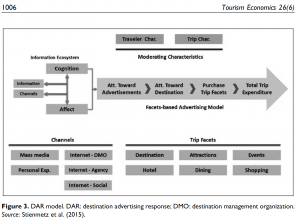New Publication: de Souza, J., Mendes, LF., Buhalis, D., 2020, Evaluating the effectiveness of tourist promotions to improve the competitiveness of destinations, Tourism Economics, Vol. 26(6), pp, 1001–1020, https://doi.org/10.1177/1354816619846748
This study focuses on the evaluation of the tourist destination advertising effectiveness. The destination advertising response DAR model was used to analyze data on the effectiveness of destination promotional campaigns on visitor expenditure, in six trip facets: destination, accommodations, attractions, restaurants, events, and shopping. Independent sample t-tests were conducted to identify any differences in total destination spending among the groups of those visitors influenced for each trip facet. A multiple regression analysis was performed to discriminate the performance of the travel facets expenditures in the estimation of total expenditures. Significant results indicate that the “destination,” “accommodations,” and “restaurants” facets directly influence the total expenditures. Self-planners had the highest variance, explaining in total visitor expenditure compared to the regression analysis results of the other two groups (i.e. travel agencies and online travel agencies). The study also explores how destinations can improve their competitiveness on tourist advertising by using technologies.
Keywords tourism, destination, marketing, advertising, competitiveness, DAR model, destinations, technologies












 New CMWH paper on maternity care
New CMWH paper on maternity care From Sustainable Research to Sustainable Research Lives: Reflections from the SPROUT Network Event
From Sustainable Research to Sustainable Research Lives: Reflections from the SPROUT Network Event REF Code of Practice consultation is open!
REF Code of Practice consultation is open! ECR Funding Open Call: Research Culture & Community Grant – Apply now
ECR Funding Open Call: Research Culture & Community Grant – Apply now ECR Funding Open Call: Research Culture & Community Grant – Application Deadline Friday 12 December
ECR Funding Open Call: Research Culture & Community Grant – Application Deadline Friday 12 December MSCA Postdoctoral Fellowships 2025 Call
MSCA Postdoctoral Fellowships 2025 Call ERC Advanced Grant 2025 Webinar
ERC Advanced Grant 2025 Webinar Update on UKRO services
Update on UKRO services European research project exploring use of ‘virtual twins’ to better manage metabolic associated fatty liver disease
European research project exploring use of ‘virtual twins’ to better manage metabolic associated fatty liver disease